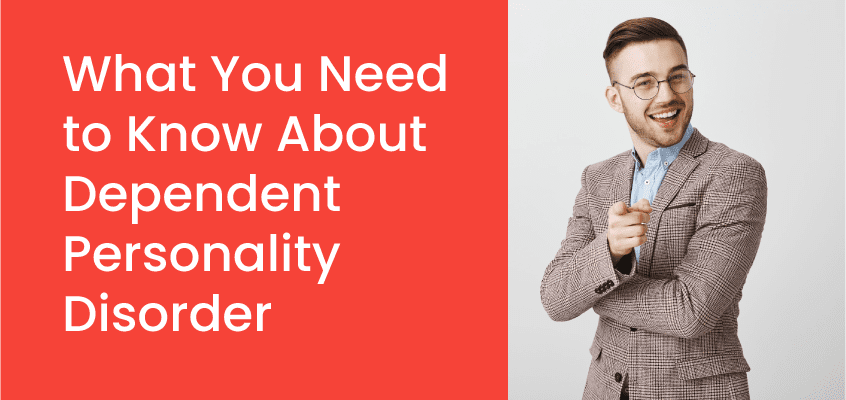Dependent personality disorder (DPD) can be challenging to live with. The constant need for reassurance and support from others that characterises this condition can be overwhelming and lead to feelings of anxiety and insecurity. However, there are ways to manage DPD and live a happy and fulfilling life. Read on to find out the common causes and treatment options for people struggling with a dependent personality disorder.
What is a dependent personality disorder?
A dependent personality disorder is a mental health condition that causes people to feel excessively needy and dependent on others. People with this disorder may have difficulty making decisions, trusting their judgment, and standing up for themselves. They may feel like they need constant reassurance and approval from others and may go to great lengths to get it.
DPD differs from codependency; a term often used to describe relationships where one person is excessively needy, and the other is overly giving. Codependency is not a mental health diagnosis. According to research, DPD typically begins in childhood or adolescence and is more common in women than men.
People with DPD often have a history of abuse, neglect, or trauma. While this is not always the case, these experiences can make it difficult for a person to develop a healthy sense of self-worth and independence.
Symptoms of dependent personality disorder
Dependent personality disorder (DPD) is a mental disorder characterised by a need to be in close relationships with other people, a fear of separation, and submissive and clingy behaviour. People with this disorder often have difficulty making decisions and taking care of themselves, and they may rely on others to make decisions for them.
They may also have difficulty expressing their opinions and needs and may be passive. Furthermore, they may become overly compliant or submissive and have problems asserting themselves. They may also be preoccupied with fears of being abandoned.
People with DPD often feel helpless and alone and may have a lot of anxiety about being separated from their close ones. They may go to great lengths to avoid being alone and be very unhappy when they are not in an intimate relationship.
Dependent personality disorder can be debilitating, but with treatment, individuals can learn to cope with their fear of separation and develop healthier relationships.
Causes of dependent personality disorder
There are many potential causes of DPD. Some experts believe genetic and environmental factors may cause it. Others think it may be the result of early attachment issues or trauma. Some potential causes of DPD include:
- History of trauma or abuse
- History of being raised by overly protective or controlling parents
- History of being raised in a chaotic or unpredictable environment
- History of being neglected or rejected.
It is important to note that there is no one specific cause of DPD. Instead, it results from a combination of factors. If you or someone struggling with DPD, know that help is available, and treatment can help to reduce symptoms and improve overall functioning.
Treatment of dependent personality disorder
A dependent personality disorder is a mental health condition that can be difficult to treat. This disorder’s most common treatment options include therapy, medication, and support groups, and therapy is often the first step in treatment.
In this case, the most common and effective therapy is cognitive behavioural therapy, which helps patients identify and change negative thinking and behaviour patterns. Cognitive behavioural therapy can help people with dependent personality disorder learn how to cope with their condition and build healthy relationships.
A psychotherapist or psychiatrist may prescribe you medicines to help with symptoms such as anxiety and depression. Support groups can provide valuable social and emotional support for people with a dependent personality disorder. These groups can help people learn how to cope with their condition and build healthy relationships.
How to overcome dependent personality disorder?
If you or someone you know has been diagnosed with DPD, know that you are not alone. This disorder is more common than you might think, and there are treatments available that can help. Here are six tips to overcome dependent personality disorder:
1. Seek professional help
If you suspect that you or someone you know has a dependent personality disorder, the first step is to seek professional help. A mental health professional can diagnose the condition and create a treatment plan.
2. Understand the disorder
Learning about dependent personality disorder can help understand the condition and learn how to cope. There are many resources available online and in libraries.
3. Identify your triggers
For many people with dependent personality disorder, specific triggers can worsen symptoms. Identifying your triggers can help you avoid them or be prepared to deal with them if they do occur.
4. Create a support system
Having a support system of family and friends can be crucial for managing dependent personality disorder. These people can provide emotional support and practical assistance when needed.
5. Take care of yourself
Self-care is vital for anyone, but it’s essential for those with DPD. Eating a balanced diet, getting enough sleep, and exercising are all important for managing the condition.
6. Avoid alcohol and drugs
Substance abuse can worsen symptoms of dependent personality disorder and lead to other problems. If you have this disorder, it’s essential to avoid alcohol and drugs.
Conclusion
A dependent personality disorder is a mental health condition in which a person relies on others to make decisions and meet their needs. It can cause problems in many areas, such as work, school, and personal relationships. People with a dependent personality disorder may have trouble making decisions independently and fear being alone or rejected by others. Genetic and environmental factors cause a dependent personality disorder. Treatment typically includes psychotherapy and medication. And finally, patience is vital. Recovery from dependent personality disorder takes time, but it is possible with treatment and support.











